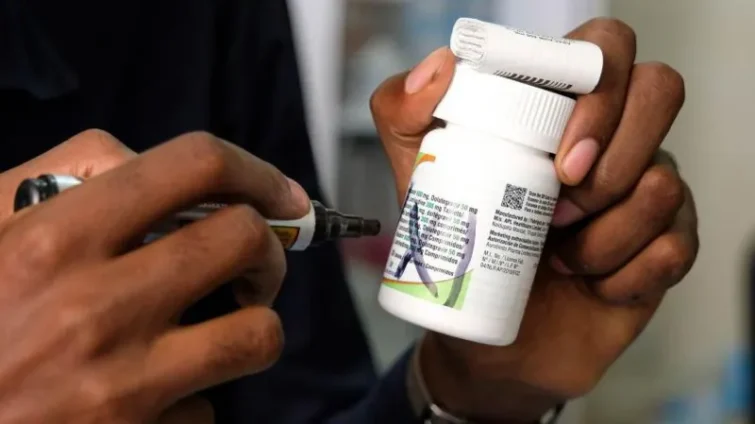Eight countries - six of them in Africa, including Nigeria, Kenya and Lesotho - could soon run out of HIV drugs following the US government's recent decision to pause foreign aid, the UN World Health Organization (WHO) said.
US President Donald Trump announced the freeze on his first day in office in January as part of a review into government spending.
"Disruptions to HIV programmes could undo 20 years of progress," WHO chief Tedros Adhanom Ghebreyesus warned.
It could also lead to more than 10 million additional cases of HIV and three million HIV-related deaths, he added, noting this was "more than triple the number of deaths last year".
Nigeria, Kenya, Lesotho, South Sudan, Burkina Faso and Mali - as well as Haiti and Ukraine - would run out of live-saving anti-retroviral (ARV) medicines in the coming months, Dr Tedros said at a press conference on Monday.
Trump's executive order paused foreign aid support for an initial duration of 90 days in line with his "America First" foreign policy.
It has affected health programmes around the world, leaving shipments of critical medical supplies, including HIV drugs, greatly hampered.
The majority of the US Agency for International Development's (USAID) programmes have since been terminated.
Despite a waiver issued in February for the US's ground-breaking HIV programme, its work has severely impacted.
Known as the US President's Emergency Plan for Aids Relief (Pepfar), it relies on logistical support from USAID and other organisations hit by the turmoil.
It has led to the "immediate stop to services for HIV treatment, testing and prevention in more than 50 countries", Dr Tedros said.
Launched in 2003, Pepfar has enabled some of the world's poorest people to access anti and has been credited with saving more than 26 million lives worldwide.
During his first days in office, Trump also announced that the US would pull out of the WHO, affecting funding for the global health agency.
"The US administration has been extremely generous over many years. And of course, it's within its rights to decide what it supports and to what extent," Dr Tedros said.
"But the US also has a responsibility to ensure that if it withdraws direct funding for countries, it's done in an orderly and humane way that allows them to find alternative sources of funding.
An estimated 25 million people are living with HIV in sub-Saharan Africa, which is more than two-thirds of the global total 38 million people living with the disease.
In Nigeria, nearly two million people are living with HIV, with many relying on receiving aid-funded medicines.
Kenya has the seventh-largest number of people living with HIV in the world, at around 1.4 million, according to WHO data.
"We ask the US to reconsider its support for global health, which not only saves lives around the world, it also makes the US safer by preventing outbreaks from spreading internationally," Dr Tedros said.
Latest Stories
-
37 Military Hospital shuts down Emergency Unit for fumigation from June 4
8 minutes -
From thirst to triumph: VIMA delivers safe water to forgotten village in Ghana
42 minutes -
Overhaul or scrap Council of State – CDD-Ghana Research
3 hours -
Abdul-Rasheed Saminu sets new National Record in the men’s 100m, books qualification for Tokyo World Championships
3 hours -
Supreme Court allows Trump to revoke legal status for 500,000 migrants
3 hours -
Eugene Boadi: Bryan Acheampong’s impact on entertainment sector
3 hours -
Faizan Zaki, 13, crowned US National Spelling Bee champion
4 hours -
US to double tariffs on steel and aluminium imports to 50%, Trump says
4 hours -
Wontumi denied access to family – lawyer confirms amidst detention
4 hours -
Meet the Brazilian sensation Fonseca hoping to shock Draper
4 hours -
Women ‘worthy’ of French Open night sessions
4 hours -
Alcaraz made to suffer in four-set win over Dzumhur
5 hours -
Minority Caucus probe into TV doctor Ann Sansa Daly’s credentials
5 hours -
In Oval Office farewell, Trump says Elon Musk is ‘not really leaving’
5 hours -
Suspect in South African student’s murder killed in police shootout
5 hours

